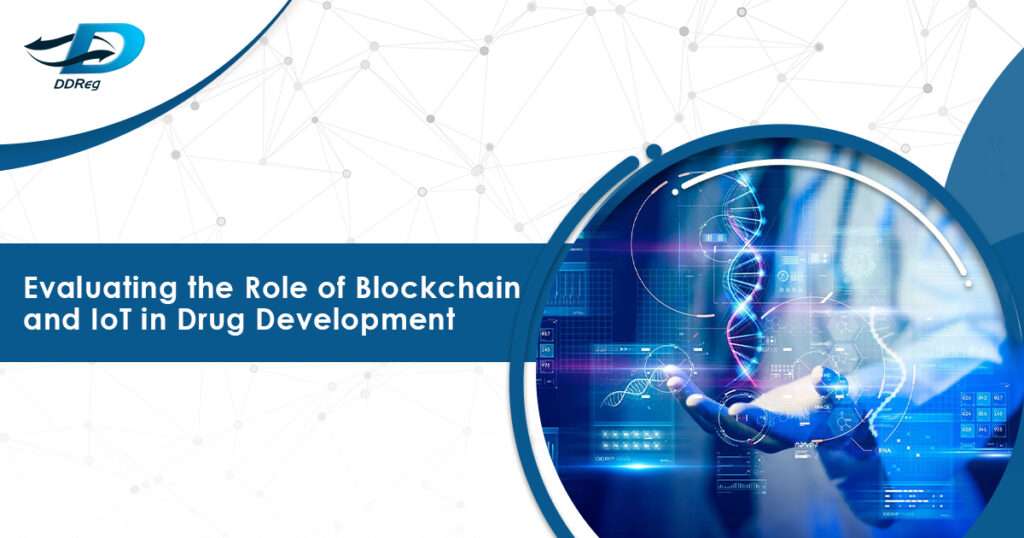
The pharmaceutical industry is undergoing a significant transformation, driven by the need for innovation and efficiency in pharmaceutical drug development. Drug development is a resource-intensive process that can take 10–15 years and cost billions of dollars to bring a medicine to market. One important aspect is the clinical trials, which face many challenges, including data integrity, patient recruitment, and regulatory compliance. Emerging technologies such as blockchain and the Internet of Things (IoT) are being integrated to address these challenges, offering greater efficiency, transparency, and improved patient outcomes. This blog explores how these technologies are reshaping drug development processes.
The Role of Blockchain and IoT in Pharmaceutical Drug Development
Blockchain acts as a decentralized digital ledger that records transactions securely across multiple computers, while IoT refers to the network of physical devices that connects and shares data in real time. Blockchain and IoT offer a transformative approach to data management in drug development. Some key benefits are:
- Enhanced data integrity and transparency: Blockchain creates an immutable, tamper-proof record of every stage in drug research—meaning every phase of a clinical trial, from initial research to approval, can be closely tracked for precision and transparency.
- Improved clinical trial management: Blockchain allows for the creation of secure, decentralized databases that make clinical trial management more efficient by tracking participants, managing consent forms, and sharing data between research institutions more efficiently – thus significantly decreasing administrative overhead costs while boosting the reliability of clinical trial data.
- Supply chain optimization: Blockchain can serve as an effective safeguard against counterfeit pharmaceutical products and ensure integrity within the supply chain from manufacturer to patient.
- Compliance with regulations: As a highly regulated industry, pharmaceutical companies must abide by stringent compliance regulations. Blockchain technology supports automated data collection and validation to meet stringent compliance.
While blockchain enhances security and transparency, IoT plays a crucial role in real-time monitoring and data collection.
IoT's Contributions to Drug Development
IoT enhances innovation in the pharmaceutical industry by enabling real-time data collection and monitoring through connected devices. IoT facilitates the clinical drug development process, especially in the area of clinical trials, by collecting data in real-time. In addition, it’s being used as part of supply chain management, where sensors can monitor factors such as temperature and humidity for drugs that need to be temperature controlled to remain effective. IoT also reduces costs as its automated monitoring reduces manual interventions as well as the risk of human error, significantly lowering development expenses.
The Convergence of Blockchain and IoT
Combining blockchain with IoT creates a strong hybrid structure capable of meeting numerous pharmaceutical challenges simultaneously. Blockchain secures the information in IoT devices and their data, while IoT enhances the overall functionality of blockchain networks. Blockchain technology revolutionizes clinical trials. Blockchain enhances research integrity, streamlines consent management, ensures regulatory compliance, and enables transparent reporting. IoT also allows remote monitoring of patients and tracking of medication adherence, which is crucial for clinical trials.
Another application is in supply chain visibility, wherein IoT sensors monitor the conditions, while blockchain logs this data, producing a transparent, immutable record. This is especially critical as companies look to comply with regulations such as the US Drug Supply Chain Security Act (DSCSA) and the EU’s Falsified Medicines Directive (FMD). The combination also adds capabilities for smart contracts, which means processes can be automated based on IoT data, creating potential savings of thousands of hours in review time.
Conclusion
In summary, blockchain and IoT technologies introduce transformative opportunities for the pharmaceutical industry, especially in drug development processes facing inefficiencies and challenges such as counterfeits or data integrity risks. As technology’s advances, they hold the potential to transform drug development, manufacture, and delivery of medications that improves lives globally.
Are you looking to integrate Blockchain and IoT into your regulatory strategy? Our experts can help ensure compliance and streamline your clinical trial processes.
Need guidance on ensuring compliance and maximizing the potential of AI technologies in your regulatory submission? Reach out to us today!
In addition to providing regulatory and pharmacovigilance services for global customers, DDReg Pharma offers specialized clinical regulatory services to assist with Clinical Trial Applications in the European Union. For further information, connect with our experts. Read more about EU regulations from the experts here: Accelerating Drug Development with Europe’s New Clinical Trial Pilots
